As another captivating year of sport comes to an end, looking back 2022 may well go down in the history books as the year of the GOAT.
Many of those in the conversation for the greatest of all time in their respective sports – some in any sports – either achieved crowning glories, brought an end to their legendary careers over the course of the last 12 months or, in the sad case of Pele, passed away.
From Lionel Messi finally being crowned world champion with Argentina at the FIFA World Cup to Serena Williams and Roger Federer both hanging up their racquets, from Ronnie O’Sullivan winning his seventh word title to Shelly-Ann Fraser-Pryce winning her fifth in the 100m alone, it was a year when the greats stole the show
The next generation of talent also began to burst through as well, though, and while we have allowed for 25 historic sporting moments in this countdown, there were many more which could have easily been included too.
For example, there is no place for Peter Wright‘s second PDC World Darts Championship title, Max Verstappen‘s second world F1 title, for continental crowns won by Eintracht Frankfurt and Roma, or for Novak Djokovic‘s triumphs at Wimbledon or the ATP Finals.
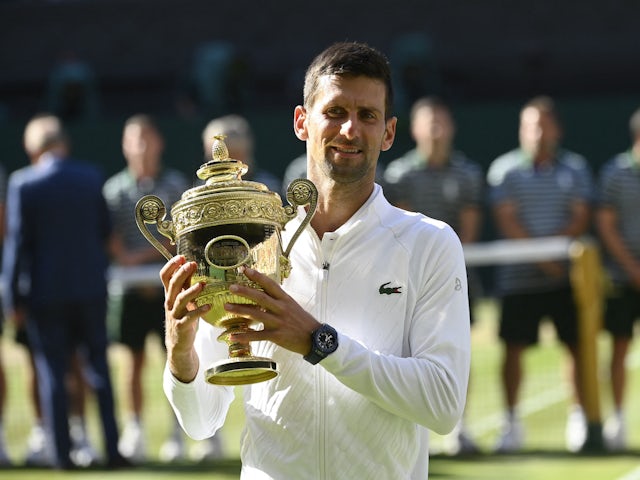 © Reuters
© Reuters
Flamengo’s Copa Libertadores triumph does not make the cut, nor does the enforced sale of Chelsea after Russia’s invasion of Ukraine or the Commonwealth Games in the summer.
In cricket, England produced some of their finest-ever Test victories, namely over New Zealand and especially Pakistan, yet both are perhaps harshly ranked outside the top 25 sporting moments of the year for us. The sport also tragically lost an icon long before his time in the great Shane Warne.
In rugby union, Argentina stunned New Zealand and La Rochelle won the Champions Cup for the first time, while the Los Angeles Rams‘ Super Bowl triumph on home turf also misses out.
Tiger Woods returned at a Masters won by Scottie Scheffler, Justin Thomas tied the biggest ever comeback in US PGA Championship history and Cameron Smith won The 150th Open Championship, while 2022 also saw the Winter Olympics, including a controversial decision to allow 15-year-old figure skater Kamila Valieva to compete despite a failed drugs test.
The fact that none of those achievements or moments made the final list gives some idea of how action-packed the year was in sport, and here Sports Mole has tried to cut the 365 days down to the very biggest and best 25 moments.
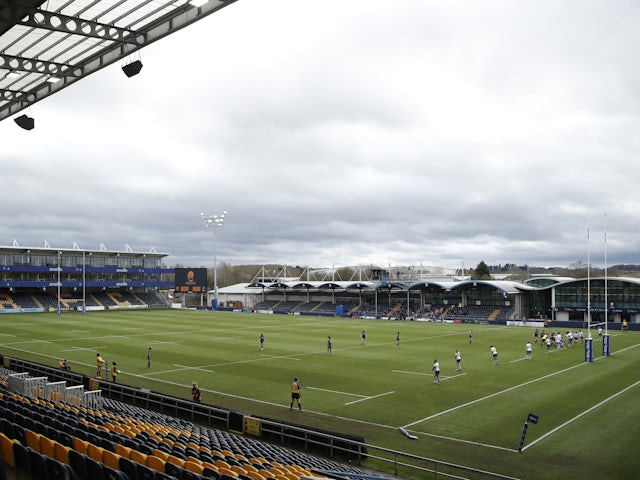 © Reuters
© Reuters
The 2022-23 English club rugby season will forever have a black cloud over it, with two Gallagher Premiership clubs entering administration.
Hundreds of staff and players lost their jobs, while tens of thousands of fans effectively lost their clubs as both Worcester Warriors and Wasps surrendered to mounting debts and unpaid bills.
Worcester were the first to go in September as they missed a deadline to provide a credible plan for the future of the club, following a string of missed payments to players and staff.
While the loss of Worcester was one of the darkest moments in English club rugby history, worse was to come less than a month later when Wasps – one of England’s most successful clubs – suffered the same fate.
Champions of England as recently as 2008 and of Europe as recently as 2007, Wasps – like Worcester – were suspended from competing for the rest of the season and relegated from the top flight, leaving their long-term future in serious jeopardy and shining a light on the fragile nature of club rugby in England.
24. Oleksandr Usyk beats Anthony Joshua to retain world titles (August 20)
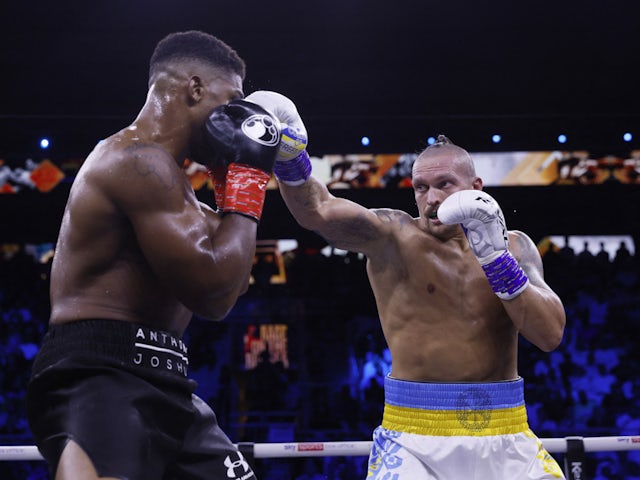
Just months after fighting for his country during Russia’s invasion of Ukraine, Oleksandr Usyk stepped back in the ring for a rematch of his heavyweight world title bout with Anthony Joshua.
The former cruiserweight king had outboxed and outclassed Joshua en route to his surprise win in the initial fight less than a year earlier, and as such entered their second bout as favourite to win once again.
With the WBA (Super), IBF, WBO and IBO heavyweight titles on the line, Usyk once again proved himself to be a class above Joshua in terms of boxing technique, despite a much-improved performance from the Briton.
The Ukrainian won by split decision following a thrilling contest, although many onlookers felt that he again deserved to be unanimously hailed as the winner.
After losing his second successive fight, Joshua threw the world title belts out of the ring and stormed off, before returning, grabbing the microphone and giving an emotional speech in front of a baffled crowd.
Joshua was left to contemplate his next move after slipping down the pecking order at the top table of heavyweight boxing, while Usyk turned his attention to a unification bout with Tyson Fury.
23. Ashleigh Barty wins Australian Open (January 29)
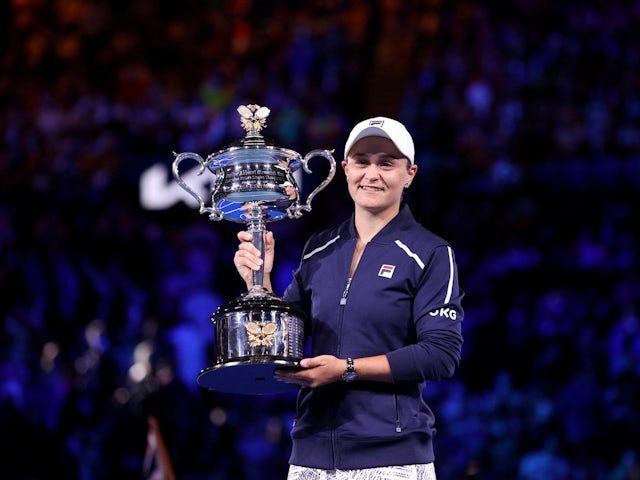 © Reuters
© Reuters
The 2022 Australian Open began in less-than ideal circumstances, with the unvaccinated Novak Djokovic’s controversial and very public late expulsion from the tournament threatening to overshadow the tennis itself.
However, home favourite Ashleigh Barty helped to quickly consign that saga to the past with her dominant run to the women’s singles title in Melbourne.
The world number one did not drop a single set en route to the trophy, and her victory over first-time Grand Slam finalist Danielle Collins saw her become the first homegrown player – male or female – to win the Australian Open since 1978.
Barty’s success saw her claim a third different Grand Slam crown of her career too, leaving just the US Open to go for a clean sweep.
22. Rafael Nadal wins 22nd Grand Slam, 14th French Open (June 5)
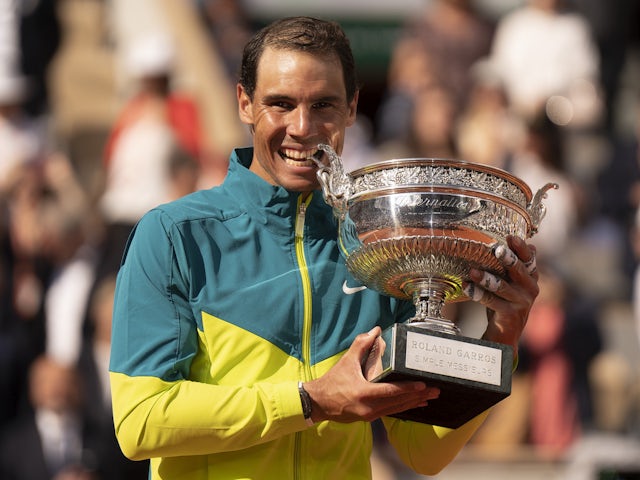 © Reuters
© Reuters
Rafael Nadal’s dominance at the French Open is such that success on its clay courts is almost taken for granted now, but that should not take anything away from yet another remarkable achievement for the Spaniard at this year’s tournament.
Having already won the Australian Open, Nadal’s triumph at Roland Garros marked the first time in his illustrious career that he has ever won the opening two majors of a calendar year.
Nadal beat four top-10 players en route to the title – only the third man to do so at any Grand Slam since the rankings were introduced in 1973 – including beating defending champion Novak Djokovic in the quarter-finals.
Considering Nadal had thought about retiring less than a year earlier due to persistent injury problems, his 2022 revival was all the more remarkable, and his straight-sets 6-3 6-3 6-0 win over Casper Ruud in the final underlined that the old guard are not ready to step aside for the next generation just yet.
The title was Nadal’s 14th at the French Open and his 22nd Grand Slam crown overall, extending two of the records he already held and edging further clear of both Roger Federer and Djokovic in the all-time title stakes.
21. Senegal win first-ever Africa Cup of Nations title (February 6)
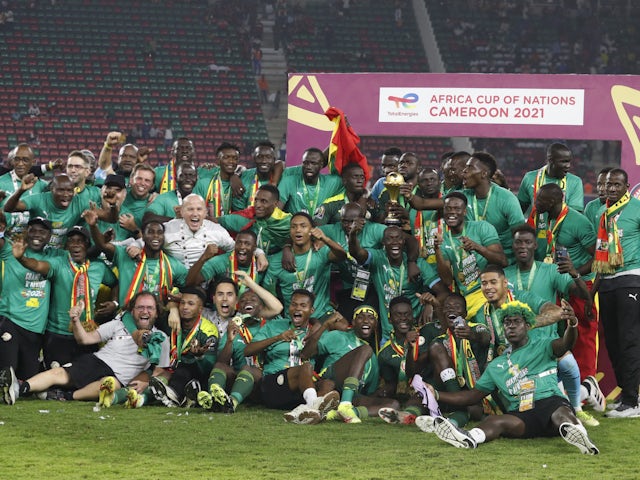 © Reuters
© Reuters
The 2021 Africa Cup of Nations provided all of the usual thrills and spills, and all of the colourful and comical moments that we have come to expect from the tournament over the years.
In the end it all came down to a showdown between Senegal and Egypt; arguably the continent’s biggest nation never to have won the tournament against the nation that had won it more than any other.
Another appealing sub-plot saw Liverpool duo Sadio Mane and Mohamed Salah – the talismans of their respective sides – go head to head for the first time ever.
Ultimately, it would be Mane who had the last laugh, although the match got off to a nightmare start for him as he saw a penalty saved in the opening stages.
The chance to redeem himself from the spot would come, though, as the 120 minutes ended goalless, continuing the trend of Egypt being taken to extra time in all of their knockout games in Cameroon.
Star man Salah took the risky decision to take his side’s fifth penalty – something Mane also chose to do for Senegal – but the shootout never made it the distance as Mane atoned for his earlier miss to wrap up a historic victory for his country before Salah had a chance to take one.
The triumph was greeted with delirious scenes of celebration in Senegal as they lifted the trophy for the very first time, having previously lost in the 2002 and 2019 finals.
20. Ireland record first-ever away series victory over New Zealand (July 16)
— Irish Rugby (@IrishRugby) July 16, 2022
Whereas English rugby suffered a year to forget on the whole, Irish rugby went from strength to strength, rising to the top of the world rankings and establishing themselves as one of the favourites to win next year’s World Cup.
Even a maiden World Cup success would struggle to top the achievement of winning a series against New Zealand in New Zealand for the first time ever, though.
After losing the opener of the three-match series, Ireland bounced back with a 23-12 triumph to make it 1-1 and send it to a decider.
The All Blacks were still firm favourites to win considering their previous defeat had seen them have a man sent off and two players sin-binned, with Ireland taking full advantage of their numerical superiority.
However, Andy Farrell‘s men produced one of their best-ever performances to beat a full-strength New Zealand side 32-22, continuing their recent hoodoo over the All Blacks to pull off arguably the greatest achievement in their history.
Incidentally, England made it a Northern Hemisphere double-header as they secured only their second-ever series win in Australia on the same day, although that proved to be a rare bright point for England whereas Ireland’s success was in keeping with the rest of their year.
19. Sport pays tribute to Queen Elizabeth II (September 8)
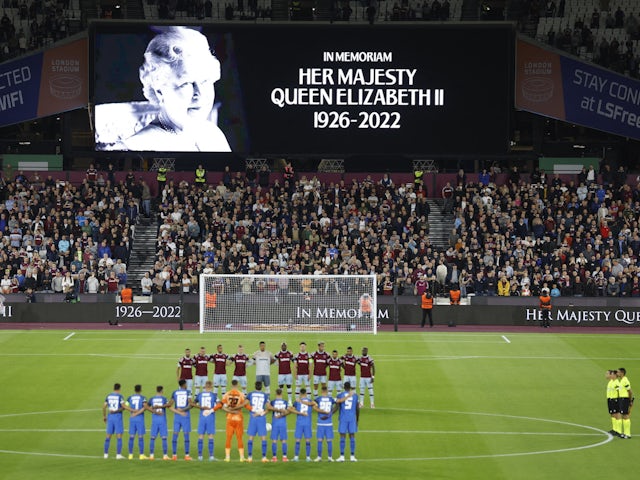 © Reuters
© Reuters
The world, and in particular the UK, was in mourning in September after the death of Britain’s longest-reigning monarch Queen Elizabeth II was announced by Buckingham Palace.
All Premier League, EFL and women’s matches were postponed on the weekend of the news, as were games in Scotland, Wales and Northern Ireland.
Day two of the Test between England and South Africa was called off, although they resumed a day later after deciding to pay a rousing tribute to the late Queen.
There were also postponements of varying lengths in rugby union and league, golf, horse racing, cycling and boxing, whereas Formula 1, tennis and athletics carried on as planned with poignant tributes paid.
18. Real Madrid come back to stun Manchester City in Champions League semi-final (May 4)
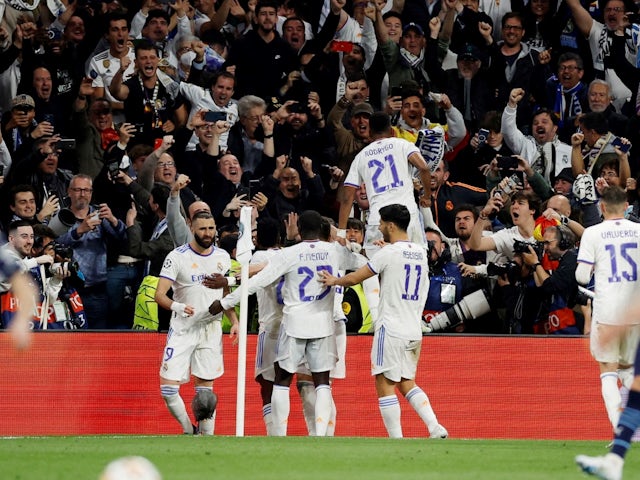 © Reuters
© Reuters
The Champions League has thrown up some incredible drama and remarkable storylines in recent years, and Real Madrid produced one of the very best in their semi-final against Manchester City in May.
There had already been thrills and spills galore in a seven-goal classic in the first leg at the Etihad Stadium, with Man City eventually running out 4-3 winners but Karim Benzema keeping Madrid’s hopes alive with a late third for his side.
A Riyad Mahrez opener in the final 20 minutes of the second leg at the Bernabeu appeared to be enough for Man City to reach only their second-ever Champions League final, which would have been against domestic rivals Liverpool following their own dramatic triumph over Villarreal a day earlier.
Indeed, Real Madrid had not even had a shot on target when the clock ticked into the 90th minute and, trailing 5-3 on aggregate, the Spanish outfit looked down and out.
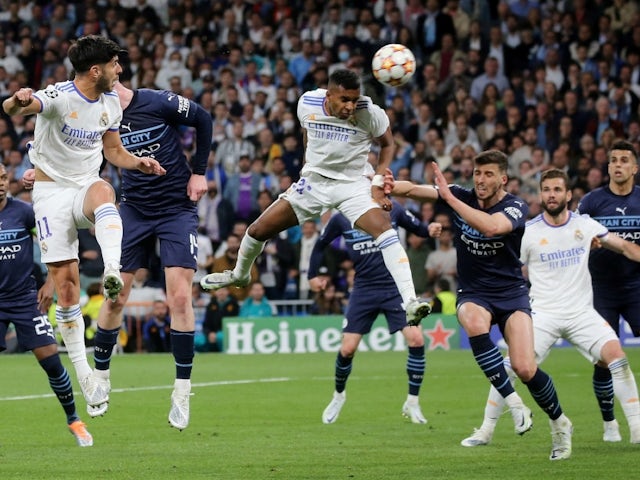
However, out of nowhere, Rodrygo popped up with two goals in the space of just 90 seconds to turn the game on its head, having also netted a crucial late goal to force extra time in the quarter-final against Chelsea.
Benzema scored the extra-time winner in that quarter-final, and he repeated the achievement in the semi-final too, converting from the penalty spot to complete an amazing turnaround which left Pep Guardiola and his Man City side shell-shocked.
Their against-all-odds run to the final, which saw them lose to Sheriff Tiraspol in the group stages and then require stirring comebacks against Paris Saint-Germain, Chelsea and Man City in the knockout rounds, ultimately set up a mouth-watering showdown with Liverpool at the Stade de France in Paris…
17. Real Madrid win 14th Champions League crown (May 28)
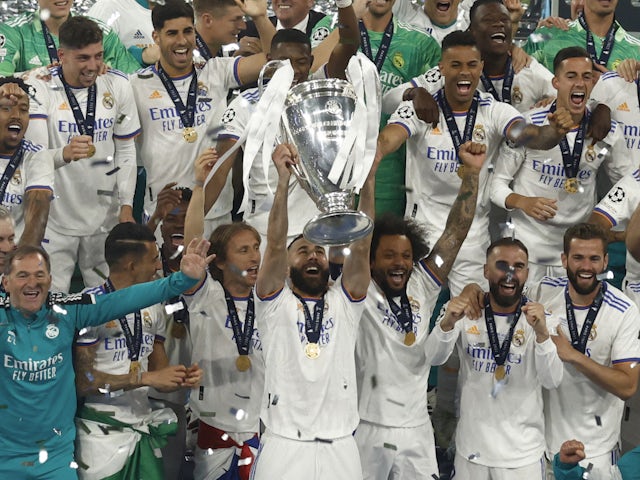
The history books will show the 2021-22 Champions League final as another success for Real Madrid, who claimed title number 14 – now twice as many as any other club – with a 1-0 triumph over Liverpool at the Stade de France in Paris.
The contest was the first time that the same two sides had met in three separate European Cup finals – after Liverpool won in 1981 and Real Madrid won in 2018 – as two of the competition’s most famous and successful sides renewed hostilities.
There was also history between Real Madrid’s manager Carlo Ancelotti and Liverpool, with Ancelotti being in the AC Milan dugout for the ‘Miracle of Istanbul’ in 2005, and then again when Milan gained revenge in the final two years later, as well as being a player in the Roma team when they lost the 1984 final to the Merseysiders.
Madrid’s success handed Ancelotti an unprecedented fourth Champions League trophy as a manager, with Vinicius Junior scoring the only goal of the game just before the hour mark.
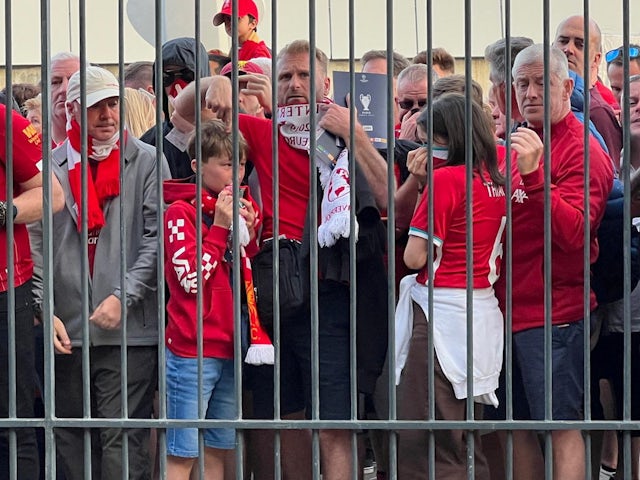 © Reuters
© Reuters
However, events on the pitch were overshadowed by the shambolic and chaotic scenes before as supporters – mainly from Liverpool – were tear-gassed, involved in crushes and subjected to heavy-handed treatment by police and locals.
Kickoff had to be delayed by 36 minutes due to poor handling of the situation by the authorities, with UEFA initially claiming the delay was down to the late arrival of fans, despite thousands being stuck outside for more than three hours before kickoff.
Supporters were initially trapped in an underpass for two hours with no information as to what was happening, and then again at the gates, which had been closed due to alleged concerns of fake tickets and people gaining access to the ground without legitimate tickets, leading to crushes which evoked memories of Hillsborough and could have easily resulted in more tragedy.
There were also reports after the match of fans being attacked and mugged at knifepoint by local gangs, placing a further stain on what was meant to be the biggest club game in football.
16. Carlos Alcaraz wins US Open, becomes youngest-ever world number one (September 11)
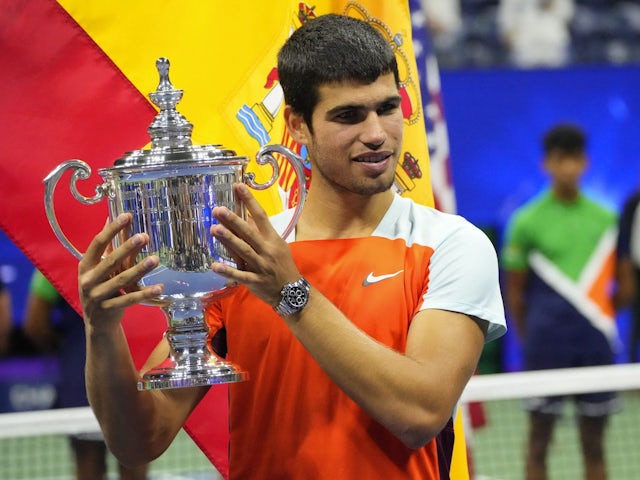 © Reuters
© Reuters
After a year in which the old guard had bounced back by winning the first three majors, the US Open was refreshingly open as the next generation of tennis looked to take centre stage.
With Novak Djokovic and Roger Federer absent, and Rafael Nadal knocked out in the fourth round, none of the players who made it to the men’s quarter-finals had won a major before, while none of the semi-finalists had ever even made it to the last four of the US Open before.
In the end, it was arguably the brightest prospect from the next generation who lifted the trophy as Carlos Alcaraz overcame Casper Ruud in four sets in the final.
In doing so, the Spaniard became the youngest number-one ranked male player in tennis history, the youngest US Open champion since 1990, the youngest major champion since 2005 and the first man born in the 2000s to lift one of the Grand Slams.
What made the triumph all the more remarkable was Alcaraz’s route to the final, which saw him taken to five sets in the fourth round, quarter-finals and semi-finals, becoming only the third man in history to reach the final after winning three successive five-setters.
Indeed, the prodigious 19-year-old spent a whopping 23 hours and 39 minutes on court throughout the tournament – a record for a major.
15. St Helens win unprecedented fourth successive Super League title (September 24)
 © Reuters
© Reuters
The 25th Super League Grand Final could not have been set up better as the competition’s two most successful sides faced off at Old Trafford, both having experienced contrasting routes to the final.
St Helens were the dominant force in the Super League and favourites to lift the trophy for a record fourth time in a row, whereas Leeds Rhinos had recovered from being second-bottom in April and upset all the odds to make it to the final.
Another odds-defying triumph proved one step too far for them, though, as the current St Helens crop cemented themselves as perhaps the greatest rugby league side in English history with a 24-12 victory.
In doing so, Saints became the first team to win four Super League titles on the bounce, the first to win 10 Super League titles in total and the first to win nine Grand Finals.
Head coach Kristian Woolf became the first person to win three successive titles as a coach in what was his final match in charge of the team, while captain James Roby won his sixth title in his record-equalling 11th Grand Final appearance.
14. Shelly-Ann Fraser-Pryce wins record fifth 100m world title (July 17)
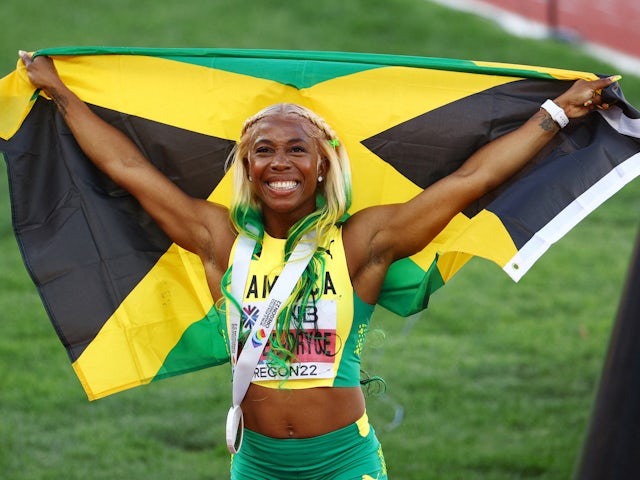 © Reuters
© Reuters
Underlining her status as one of the greatest sprinters in history, Shelly-Ann Fraser-Pryce picked up an unprecedented fifth 100m world title at the age of 35 in July.
Almost 14 years after her first global 100m triumph, which came at the Beijing Olympics, the Jamaican continues to make history and now has 10 World Championship gold medals to her name, as well as four silvers.
At 35, she is the oldest world champion in any individual track event, while her winning time of 10.67s broke the championship record and was the sixth-fastest in women’s sprint history.
Fraser-Pryce therefore claimed top spot on the podium in the deepest women’s 100m World Championship race ever, with Jamaica earning a clean sweep of the medals and seven of the eight finalists recording times of under 11 seconds.
The World Championships in Eugene, Oregon also saw athletics bid farewell to another legend of the sport as Allyson Felix bowed out with a bronze in the relay.
13. New Zealand beat England to win Women’s Rugby World Cup (November 12)
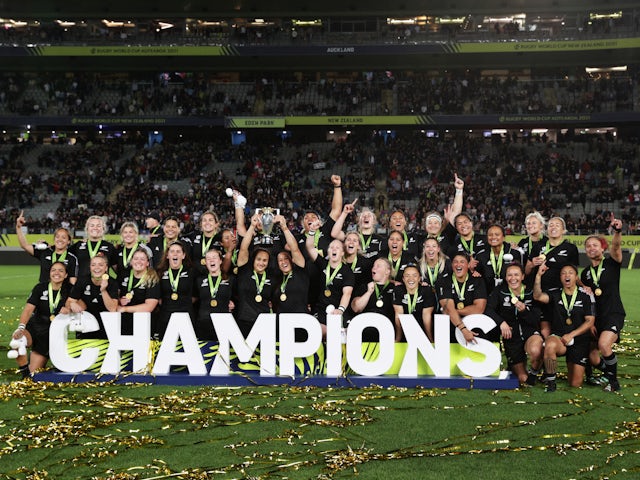 © Reuters
© Reuters
The final of the Women’s Rugby World Cup was the one many predicted and hoped for heading into the tournament – the world’s number-one ranked team England against hosts and defending champions New Zealand.
Despite New Zealand’s imperious World Cup record and home advantage, England arguably went into the final as favourites having won all of their previous 30 Test matches – a world-record run which extended back to 2019.
The two sides had met in four of the previous five World Cup finals, with New Zealand winning all of them, but their hopes of making that five out of six looked bleak when England raced into a 14-0 lead inside the opening 15 minutes of the final.
However, an 18th-minute red card for Lydia Thompson handed New Zealand a precious lifeline, and the Black Ferns were level within seven minutes as they took full advantage of their numerical superiority.
Despite playing more than an hour with 14 women, England were still within touching distance in the dying embers of the match and had the chance to force extra time when they were awarded an easily-kickable late penalty.
However, England opted to go for the win by kicking to the corner – a decision they repeated when winning another penalty from the resulting maul.
On the second occasion, though, their trusty lineout and maul – which had been the biggest weapon in their record winning streak – let them down as they telegraphed the throw to the front, allowing New Zealand to steal the ball and kick it out for a dramatic 34-31 victory in front of a record crowd at Eden Park.
12. Australia win Rugby League World Cup (November 19)

Speaking of World Cup dominance, few teams in the history of sport can match Australia’s dominance of rugby league, particularly at World Cups, and that near-monopoly added another chapter this year.
The two semi-finals at the tournament were instant classics as Australia overcame fierce rivals New Zealand 16-14 in one of the best matches in the sport’s history, one day before hosts England were stunned 27-26 by Samoa via a golden-point winner.
Samoa’s passage to the final marked a moment of history as they threatened to upset the established elite in the sport, looking to become only the fourth different team to have their named etched on the trophy.
Australia, by contrast, had reached the final of every single World Cup since the inaugural edition in 1954 and ran out relatively comfortable 30-10 winners at Old Trafford for their 12th title.
Nine of those crowns have come in the last 10 editions of the tournament, including each of the last three, once again underlining their status as one of the great sporting dynasties.
11. England win T20 World Cup (November 13)
CHAMPIONS 🏴 🎉#T20WorldCup pic.twitter.com/8rNbHBLpws
— T20 World Cup (@T20WorldCup) November 13, 2022
2022 will go down as a memorable year for English cricket, with their Test team enjoying a remarkable revival under Brendon McCullum and Ben Stokes, taking their destructive attacking instincts from the shorter forms of the game into the five-day arena.
However, the highlight of the year for England came at the T20 World Cup, when they beat Pakistan to win their second title and became the first men’s team to hold both the ODI and T20 world titles at the same time.
Stokes was unsurprisingly the star of the show with the bat, fully justifying his recall to the 20-over format with an unbeaten 52 off just 49 deliveries, including the winning runs as England won by five wickets and with an over to spare.
Man of the match and player of the tournament Sam Curran took three for 12 with the ball as England limited Pakistan to 137-8, a total they always looked capable of chasing down despite semi-final star Alex Hales losing his wicket early.
England had been on the brink of being knocked out earlier in the tournament having lost to Ireland and then seen their match against Australia abandoned due to poor weather, but they recovered to enjoy their crowning moment of the year at the MCG.
10. Ronnie O’Sullivan wins record-equalling seventh world title (May 2)
🏆🏆🏆🏆🏆🏆🏆Ronnie O’Sullivan has equalled Stephen Hendry‘s record with a 𝗦𝗘𝗩𝗘𝗡𝗧𝗛 World Championship title!#ilovesnooker | @WeAreWST pic.twitter.com/bwsnniNZkS
— Eurosport (@eurosport) May 2, 2022
Twenty-nine years after becoming the youngest player to win a professional ranking title, Ronnie O’Sullivan became the oldest person to win the world title with his record-equalling seventh crown in May.
The 46-year-old drew level with Stephen Hendry’s mark on his 30th appearance at the World Championships – another record he equalled – with an 18-13 victory over Judd Trump in the final at the Crucible.
The tournament also saw O’Sullivan surpass Hendry’s record for most victories at the Crucible, further writing his name into the snooker history books as perhaps the greatest player to ever pick up a cue.
Indeed, the most surprising aspect of his seventh world title is that it took him so long to equal Hendry’s record total, having won his first 21 years ago in 2001.
9. Serena Williams retires at US Open (September 3)
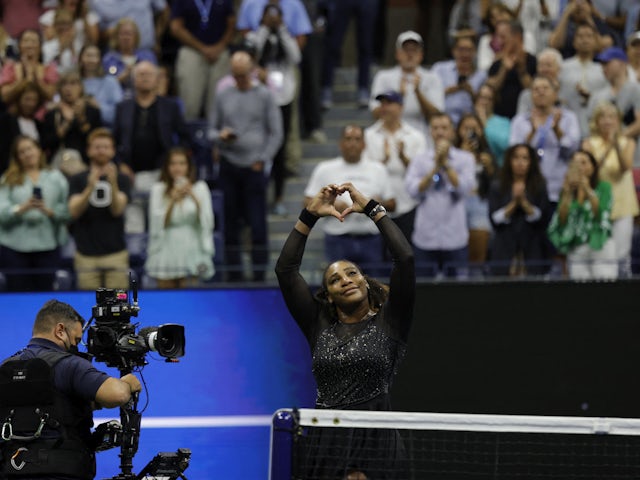 © Reuters
© Reuters
While Serena Williams has since insisted that she has not fully retired from tennis and that a future return is likely, the US Open gave fans the chance to bid farewell to arguably the greatest women’s player of all time.
The 23-time Grand Slam champion announced prior to the tournament that she would focus on other ventures after the final Grand Slam of the year, and surpassed many expectations by making it as far as the third round in only her fourth tournament in more than a year.
However, her third-round tie with Ajla Tomljanovic proved to be one step too far for the 40-year-old, who went down 7-5 [4]6-7 6-1 at the hands of the Australian in New York.
Serena did not go down without a fight, though, saving five match points before eventually succumbing to a defeat which brought an end to a legendary 27-year professional career.
Williams ultimately fell one short of Margaret Court‘s all-time record of 24 Grand Slam singles titles, but her tally of 23 is an Open Era record which does not look like being challenged any time soon.
8. Cristiano Ronaldo leaves Manchester United (November 22)
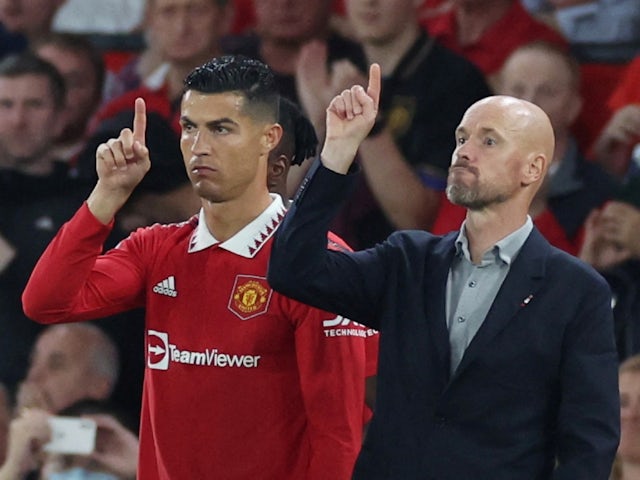
After months of speculation over his future, Cristiano Ronaldo went nuclear at Manchester United with an explosive interview from which there would clearly be no way back.
Having already refused to come on as a substitute earlier in the season and fallen down the pecking order under new boss Erik ten Hag, Ronaldo’s frustration grew to such an extent that he felt the only way out was to spill his truth to Piers Morgan just hours after United played their final game ahead of the World Cup break.
In the interview, Ronaldo insisted that he has no respect for Ten Hag, in addition to hitting out at Manchester United’s lack of progress as a club since he was last there in 2009.
Many regarded it as a high-profile case of one of the greatest footballers of all time throwing his toys out of the pram after seeing his playing time reduced, even at the age of 37.
However, Ronaldo ultimately got what he wanted as the two parties mutually agreed to terminate his contract on November 22, although the saga dragged on throughout a World Cup which did further damage to the Portugal international’s reputation.
7. Saudi Arabia, Japan, Morcco shock the world (November & December)
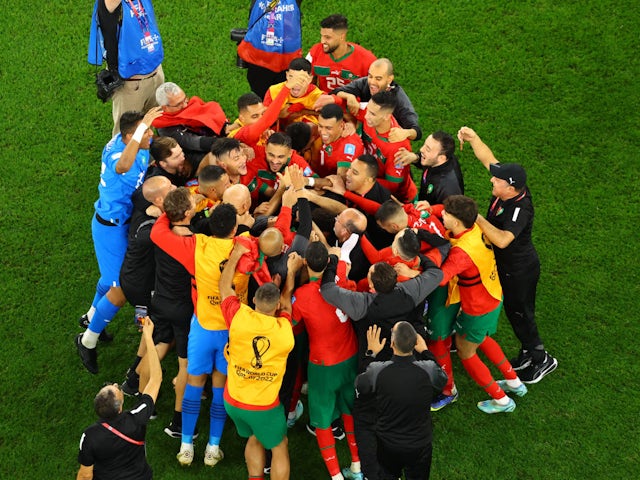
The 2022 World Cup was the tournament of the underdog, with a number of teams punching above their weight to provide some of the most memorable World Cup results of all time.
The first of those shocks came only three days into the tournament when Saudi Arabia produced perhaps the biggest World Cup upset of all, toppling one of the pre-tournament favourites Argentina in their opening game.
Lionel Messi’s side went into that match on a 36-game unbeaten run and knowing that even a draw would see them break the world record for the longest undefeated streak in international football history, and they made a good start when Messi gave them the lead.
However, a string of disallowed goals in the first half preceded a stunning Saudi Arabian turnaround in the second, with Saleh Al-Shehri and Salem Aldawsari scoring within five minutes of each other to write their names into World Cup folklore.
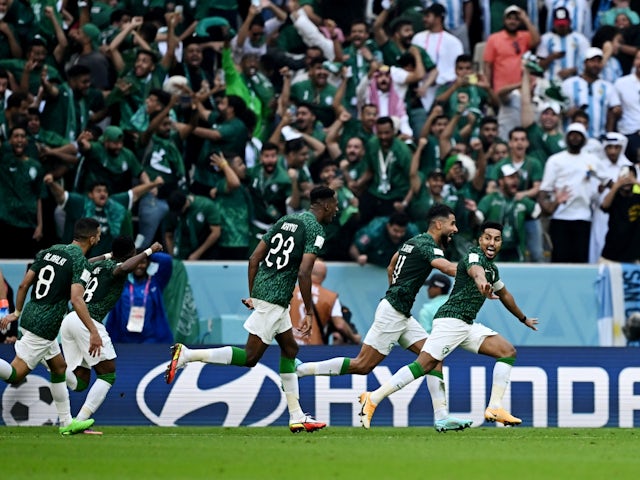
It was a nightmare start to the tournament for Argentina, although they were ultimately able to more than make up for it, and the same could not be said for Germany and Spain, both of whom fell to Japan in the group stages.
The Asian nation produced a quickfire comeback in the final 15 minutes of their opener against Germany to win 2-1, and just over a week later did the same to stun Spain, this time netting twice in the space of three minutes to turn a one-goal deficit into the 2-1 win in the most dramatic – and slightly controversial – circumstances.
The big dark horses of Qatar 2022 turned out to be Morocco, though, as they became the first African nation to make it into the semi-finals of the tournament.
The Atlas Lions held Croatia to a stalemate in their opening game before beating Belgium in their second match and then Canada to round off their group stage in style.
Morocco were still major underdogs heading into their last-16 tie against Spain yet overcame the 2010 winners on penalties, and then made it an Iberian double-header of scalps by beating Portugal in the quarter-finals.
A semi-final with France ultimately proved to be a step too far, despite them being on top for much of that game, and defeat to Croatia in the third-place playoff made it back-to-back losses at the end of their campaign, but their fourth-placed finish was still new ground for African nations on the biggest stage, and their support throughout was one of the defining takeaways from the tournament.
6. Rafael Nadal wins 21st Grand Slam title (January 30)
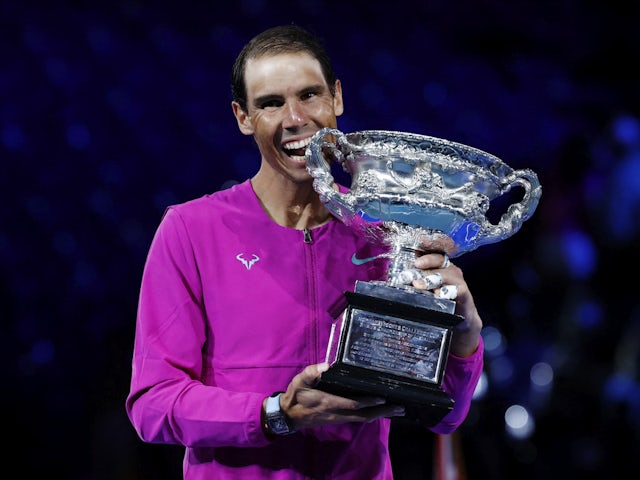 © Reuters
© Reuters
One day after Ashleigh Barty’s home heroics, Rafael Nadal penned yet another chapter into the history books himself by winning an unprecedented 21st Grand Slam title – moving ahead of Roger Federer and Novak Djokovic in the all-time standings.
The absence of nine-time winner Djokovic certainly opened the door for Nadal, but that made his phenomenal comeback no less impressive.
The Spaniard had been on the brink of retirement during an injury-plagued 2021 and by his own admittance did not expect much from his time in Melbourne, yet he still managed to battle his way through to a 29th Grand Slam final.
US Open champion Daniil Medvedev stood in his way, bidding to become the first player in the Open Era to win their first two Grand Slam titles back to back, and the first player outside of Federer, Nadal and Djokovic to win successive Grand Slams this century.
The world number two was well on course to achieve that too as he took a two-set lead, but Nadal’s legendary resolve once again kicked in and the 35-year-old – 10 years Medvedev’s senior – fought back as he has so often done.
In total, the epic lasted almost five-and-a-half hours – the second-longest Grand Slam final ever – and it was Nadal who eventually emerged victorious to ensure that his second Australian Open title and record 21st in total was arguably his most remarkable.
5. Manchester City win Premier League title on dramatic final day (May 22)
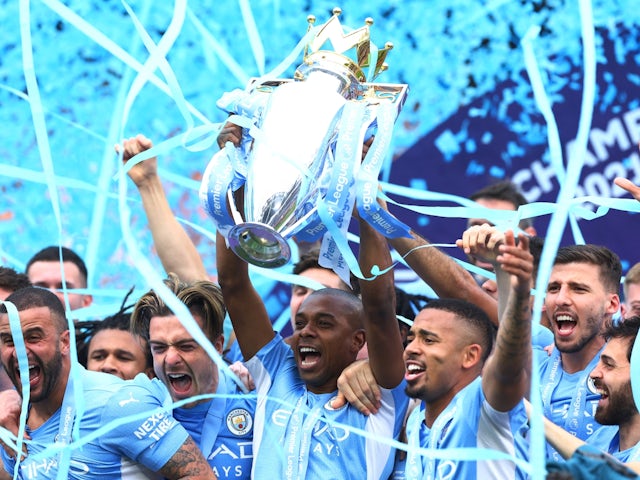
At one stage in January, Manchester City looked nailed-on for the Premier League title, boasting a 14-point lead over closest challengers Liverpool.
However, a remarkable turnaround in the second half of the season saw Liverpool close that gap back down to one point heading into the final day, which turned into one of the most dramatic in Premier League history.
Pep Guardiola’s side went into their game against Aston Villa – managed by Liverpool legend Steven Gerrard – knowing that they simply needed to match or better Liverpool’s result to guarantee them the title, whereas Liverpool needed a favour from their former captain and to win themselves.
Jurgen Klopp‘s men fell behind to Wolverhampton Wanderers early, but soon equalised and were handed a huge injection of hope when news filtered through that Villa were 2-0 ahead against Man City.
Ten years on from Sergio Aguero‘s famous last-minute title-winning goal, Man City produced another comeback for the ages as they netted three goals in the space of just six minutes to turn their game around and change the entire picture within the blink of an eye.
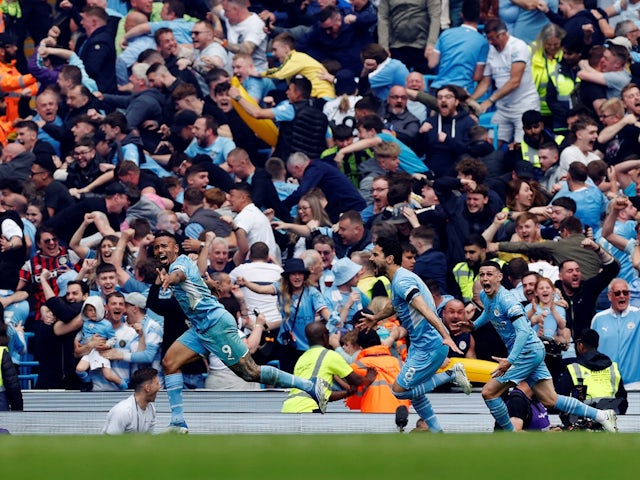
Liverpool also scored twice late on to win their game, but Man City’s result ultimately meant that was in vain as Guardiola’s men lifted another Premier League trophy by a solitary point ahead of the Merseysiders.
There as also drama at the other end of the table as Everton came back from two goals down to win 3-2 and secure their survival, prompting a pitch invasion in the process.
Leeds also confirmed their top-flight status for another season on the final day courtesy of victory over Brentford, while Burnley‘s loss to Newcastle United sealed their fate and ended their six-year stay in the Premier League.
Meanwhile, in the battle for European places, Tottenham Hotspur held off Arsenal to qualify for the Champions League, while defeats for both Manchester United and West Ham United on the final day saw them qualify for the Europa League and Europa Conference League respectively.
4. England Women win Euros (July 31)
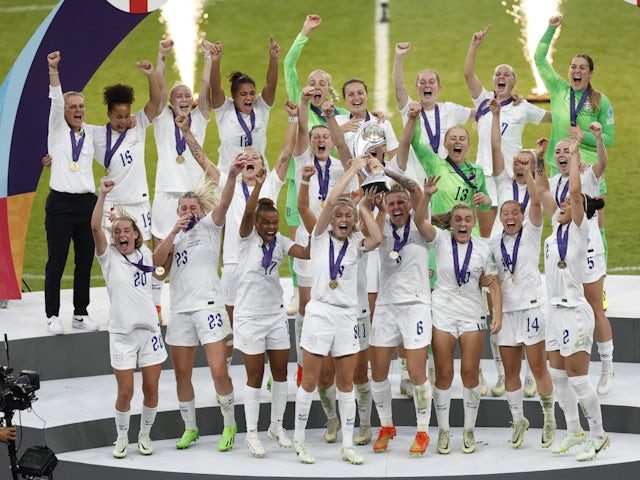 © Reuters
© Reuters
Fifty-six years after England’s men had clinched the nation’s only previous major international trophy, England’s women brought football home in front of a record crowd at Wembley.
More than 87,000 packed into the stadium – the biggest-ever crowd at either a men’s or a women’s European Championship game – as England overcame Germany after extra time in the final at Wembley, just as the men had done in 1966.
Germany had won all eight of their previous European Championship finals heading into the contest, but fell behind to Ella Toone‘s opener shortly after the half-hour mark.
Lina Magull levelled things up for the Germans 11 minutes before the end of the 90, ultimately forcing extra time, when Chloe Kelly – earlier brought on for the tournament’s injured top-scorer Beth Mead – poked home the winner to spark scenes of wild celebrations.
3. Roger Federer bids tearful goodbye to tennis (September 23)
 © Reuters
© Reuters
After 1,382 wins in 1,750 matches, 20 Grand Slam titles, 310 weeks as world number one and 103 ATP Tour triumphs, the greatest tennis player of all time finally hung up his racquet in September as Roger Federer retired from the sport.
The 41-year-old had barely featured in previous years due to injury, but nonetheless his announcement that he was retiring at the Laver Cup in London was met with universal sadness.
The pictures of Federer sat next to his greatest rival and fellow GOAT contender Rafael Nadal, with both players in floods of tears at the end of the best era in the sport’s history, were some of the defining images of the year.
As it happened, Federer’s final match ended in defeat, but that was of secondary importance as he went out alongside Nadal in a thrilling doubles encounter for Team Europe against Team World, with his other great contemporaries Novak Djokovic and Sir Andy Murray watching on.
The main event came after the match itself, though, as tributes were paid to Federer and he got his chance to say goodbye to an adoring tennis world.
2. Pele, the ‘King of Football’, dies aged 82 (December 29)
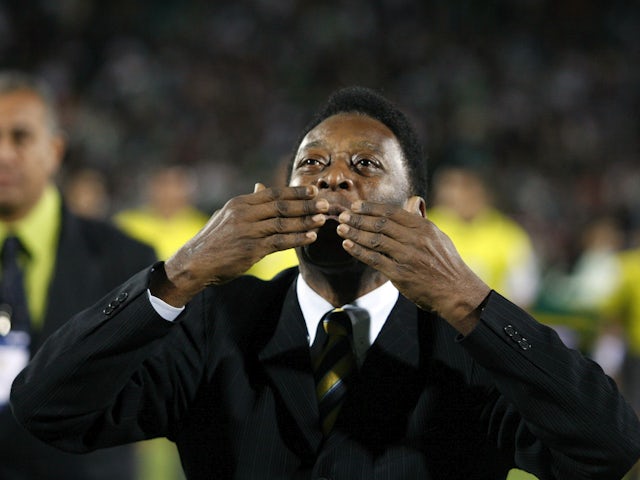 © Reuters
© Reuters
A glorious year of sport ended on a sad note as one of its greatest exponents – Brazilian icon Pele – passed away at the age of 82 just three days before the end of 2022.
The legendary footballer, widely regarded as one of the greatest ever in his or any sport, had spent the final month of his incredible life in hospital battling colon cancer and died following multiple organ failures as a result of the disease.
The world of football, sport and beyond poured forward with tributes to the great man, who remains the only male player to have won three World Cups.
Pele made his club debut for Santos as a 15-year-old in 1956, his senior Brazil debut as a 16-year-old the following year, and by the age of 17 he was a world champion, starring as the Selecao won the World Cup for the first time.
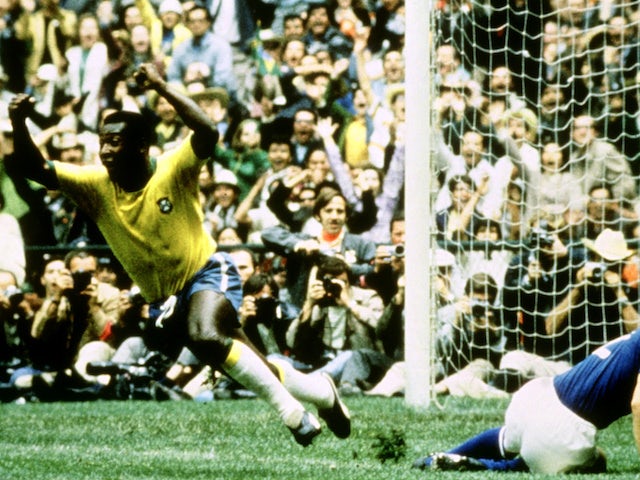 © Reuters
© Reuters
The former forward scored a hat-trick in the semi-final and a brace in the final to establish himself as the first global football superstar, while he remains the youngest player to ever win the World Cup and score in a World Cup final.
Injury curtailed his involvement in Brazil’s success four years later, but he was centre stage as part of the all-conquering 1970 side which is still regarded by many as the greatest the game has ever produced.
Pele eventually hung up his boots with a world-record 1,279 goals in 1,363 games – although that total includes friendlies – along with a plethora of other awards and accolades, including being named FIFA’s player of the century in 2000.
While the debate of who is the greatest footballer of all time evolved again in 2022, there is no doubt that Pele is firmly in the conversation.
1. Lionel Messi’s Argentina beat France in greatest-ever World Cup final (December 18)
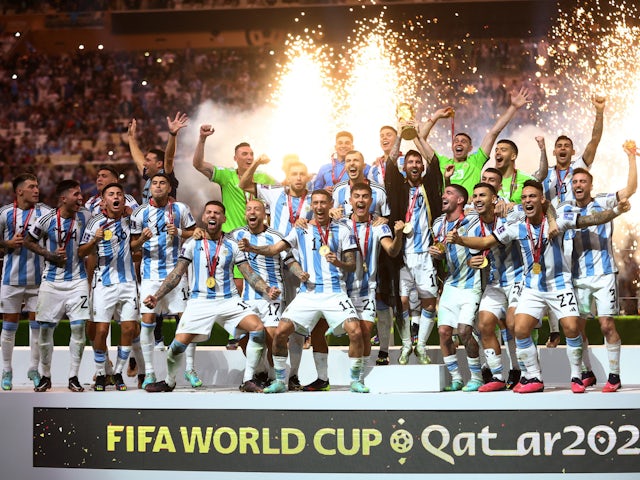 © Reuters
© Reuters
For all of the controversy surrounding the 2022 World Cup in Qatar, matters on the field did not disappoint and the host nation could not have dreamt of a better finale as Argentina and France – both of whom’s star men played for Qatari-owned Paris Saint-Germain – went head to head.
For much of the contest it looked like Lionel Messi’s Argentina would comfortably get the better of Kylian Mbappe‘s defending champions France, with the South American outfit dominating the majority of the match and taking a deserved two-goal lead through Messi’s penalty and a stunning team goal which was finished off by Angel Di Maria.
Indeed, it took France more than 70 minutes to register a shot, and more than 80 minutes to chalk up their first shot on target, but the latter sparked a quickfire turnaround which stunned Argentina and drew France back level.
Mbappe first converted from the penalty spot before firing a brilliant first-time volley into the bottom far corner just 97 seconds later, ultimately forcing extra time despite Messi coming close to a storybook ending with a fierce shot in the 97th minute which Hugo Lloris saved.
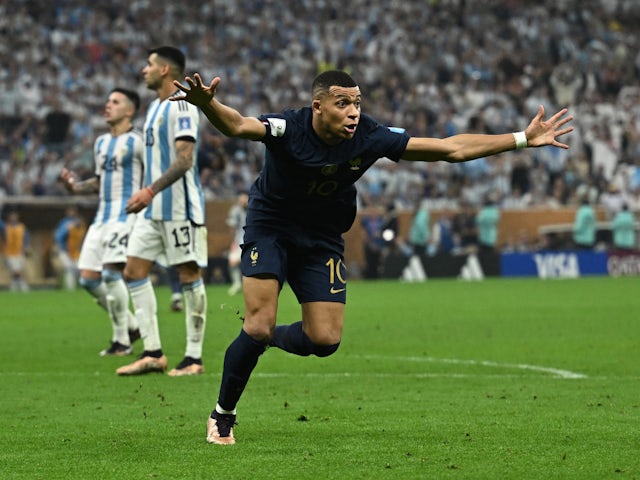
The additional 30 minutes threw up yet more incredible drama, with Messi scrambling his second of the night over the line before Mbappe responded with his second penalty and third goal of the game, becoming only the second man to score a World Cup final hat-trick, clinching the Golden Boot and becoming the leading scorer in World Cup finals of all time, all at the age of just 23.
Aside from the goals, Dayot Upamecano made two crucial blocks, Kolo Randal Muani came close, Lautaro Martinez squandered more than one chance and Emiliano Martinez made one of the all-time great World Cup saves at the death to ultimately force penalties.
Messi and Mbappe both converted their penalties, but Kingsley Coman and Aurelien Tchouameni missed for France and Argentina’s Gonzalo Montiel stepped up to slot the winning spot kick home.
In addition to handing Argentina their first World Cup crown since 1986, the trophy also completed the set for the great Messi, underlining his status as the best player in the history of the game
SRC: https://www.sportsmole.co.uk/








